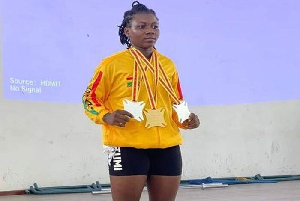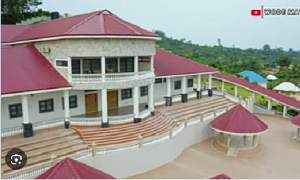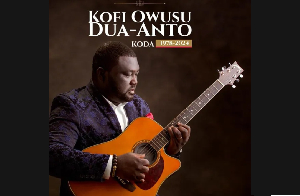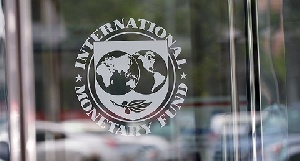- Home - News
- TWI News | TV
- Polls
- Year In Review
- News Archive
- Crime & Punishment
- Politics
- Regional
- Editorial
- Health
- Ghanaians Abroad
- Tabloid
- Africa
- Religion
- Election 2020
- Coronavirus
- News Videos | TV
- Photo Archives
- News Headlines
- Press Release
Opinions of Friday, 12 November 2010
Columnist: Bishop Dela
Crisis!!! Is NDC In Self-Destruct Mode?
Everybody knows that NDC is presently in serious crisis and it is getting worse by the day. Everybody also knows that NDC’s problems are internally created and fanned by those who should rather be making serious efforts to keep the party united. What many members of the party are unwilling to do is to carefully analyze the problems; trace their sources; speak the truth without fear; and charge those who have been elected by delegates of the party—to lead them and manage the party—to show leadership by rising to the occasion and resolving all the differences in the party; reconcile all feuding members; and unite the rank and file of the party for election 2012. The party leadership has so far failed its teeming supporters and Ghanaians in general. The leadership referred here includes the Council of Elders; the National Executive; the Founder; the Presidency; and other identifiable organs of the party, which have leadership responsibilities. Considering that the party’s problems started very early on in the life of President Mills’ administration, but has been left unattended for nearly 2 years until it is now getting out of hand, one may conclude without mincing word that all the elders of the party have failed the leadership test and they must bow their heads in shame.
In this article, I will speak some truths and incur the wrath of many, who by their action or inaction are contributing to the destruction of NDC. They will know I am speaking the truth, although they will pretend I am wrong, and many of them shall describe me as “too known” for saying it as I see it. My hope is that someone very reasonable will take his or her time to carefully digest my views and make the appropriate intervention by calling the party’s leadership, particularly, the Presidency and the office of the Founder to order. The pertinent question this article attempts to answer is how NDC drifted into this state of divisiveness and what is the way forward if the party intends to remain formidable in the 2012 elections. To start, it is not unreasonable to assume that for the common purpose to wrest political power from the former NPP regime, NDC had tried to overcome most of its internal difficulties and appeared largely as a united party until their victory at the polls in early 2009. One would have thought that what had appeared as unity in the party would be consolidated, sealed, and properly managed to support the administration of President Mills, and ride on that into the 2012 general elections. Unfortunately, this was not achieved; so, what happened?
At the very onset in the reign of President Mills’ administration, very prominent and leading members of the party had complained, mainly in very rude and unpalatable terms, about various grievances, including exclusion of some leading members of the party from government; hijacking of the government by some persons originally unknown in the party; stuffing the presidency with many “returnees” of the party who were considered to have abandoned the party during the 8-year difficult times in opposition; neglect of ordinary members of the party described as “foot soldiers” by many in government who had depended on these “foot soldiers” prior to the elections; and accusation of the government of incompetence, among others. Agitation by the so-called foot soldiers about the delay in placing them in employment and the appointment of certain individuals into various positions of responsibility appeared more as expression of dislike for the President’s style of doing things. This, in my mind, is no longer a huge problem for the government because gradually, the government is reaching out to these people and helping them to understand President Mills’ style and accept it in the interest of the party. This leaves us with the first set of problems involving the complaints of certain leading members, particularly, the Founder of the party, Former President Rawlings and Mr. Ewkow Spio-Garbrah.
Clearly, former President Rawlings and Mr. Spio-Garbrah sought to represent a fiery dissenting and disillusioned faction of the party. They quickly assumed this status because they have their own problems with the government and they did not hide them but spoke publicly and loudly about them very early on in the life of the administration. Many within and outside of the party thought that the two leading members had erred in the manner they selected to express their misgivings about the government. Though I have not listened closely to these gentlemen to learn whether or not they believed they had alternative avenues of expressing their grievances, I am also inclined to believe that they could have registered their protestations in a better way. However, I also recognized that the two leading members of the party had problems that worried them and the manner they chose to express these problems did not necessarily resolve the problems or trivialize them.
It is important also to note that these complaining gentlemen are not from any opposition parties, and are not merely ordinary members of the party. They are very influential members of NDC and have large following in the party. One would think that if these people have problems and have spoken about them, immediate steps shall be taken to listen to them and resolve the problems in the interest of reconciliation and unity of the party. Again, and unfortunately, it appears that those in the position to resolve problems in the party are not interested at all in resolving the problems but are rather interested in showing to the world that the way the complaints were made were devilish and the complainants must rather be condemned and damn the consequences. It beats my imagination why they would not see the danger in this attitude. That is not all; the national executive of the party has also proved incapable of resolving the difficulties because various executive members have made comments and issued statements that were clearly biased and not geared towards mediating between feuding personalities in the party. Let’s look at the specific complaints of former President Rawlings and Mr. Spio-Garbrah, and let’s look also at the Nana Konadu factor.
Mr. Spio-Garbrah was the fiercest contestant against President Mills at NDC’s 2006 congress that re-elected Professor Mills as the party’s flag bearer. He quickly threw his support behind the then candidate, Professor Mills and was in the trenches with the Professor to ensure that total victory was achieved in the 2008 elections. Many political observers assumed as conclusive that Mr. Spio-Garbrah was going to get a top job in the Mills’ administration. As it came to pass, he did not get anything. Naturally, he was disappointed and many Ghanaians were equally disappointed. He could not properly contain his disappointment and frustration, so, he spoke out publicly and criticized the administration, describing many appointees as “Team B” materials. What reaction did he attract from the presidency and people who are close to the administration? He was lambasted, castigated, and even insulted by many junior members of the party.
It was even reported that one close confidant of the President did say that Mr. Spio-Garbrah would get a post in President Mills’ administration only over his (the President’s confidant’s) dead body. As for the NDC national executive, the least said about it the better. They would say their paramount interest was to support the President, but they failed to recognize that the President needed a united party to support his presidency. Incredibly, this little issue has been left unattended for nearly two years with those who could make a change interested only in playing hardball and showing where power lies. All of this was done without thinking of the effect on the party. Somehow, those opposed to Mr. Spio-Garbrah thought they would make him irrelevant in the party by shouting to the world that the man was too ambitious, as if anything is wrong with being ambitious. I will end this section by reiterating the point I have made constantly on another forum that there is a lot of wisdom in President Obama appointing Mrs. Hilary Clinton into his government and President Kufuor appointing Nana Akufo-Addo and many of those who contested NPP’s primary against him in 1999 into his government. It controlled their ambitions, and united their parties. NDC has failed miserably here and many are ignorant of this only because they have to please the President at all times.
What is former President Rawlings’ concern? He has publicly complained about incompetence, “greedy bastards,” delay in prosecuting people he considered as criminals in the previous administration, among others. My view is that many of these are minor issues. The important issues of concern to Ex-President Rawlings include his perception that many people at the relm of affairs at the Presidency are new in the NDC or are those who had abandoned him and the party during the difficult 8 years in opposition. Many of these people may include friends of President Mills and people who were never in NDC and probably do not even like Ex-President Rawlings in the first place. Naturally, Mr. Rawlings may feel that these people have erected impregnable shields around the President in many ways than the eye can fathom. Again, Mr. Rawlings may feel that these people are hijacking the NDC for their selfish interests and drawing the President away from the core principles of the NDC, especially when Professor Mills had attended the commemoration of June 4th and December 31st when NDC was in opposition but recently failed to attend the June 4th commemoration in Tamale, and there was even a rumour that all government appointees were instructed not to attend.
As a Founder of NDC, does Mr. Rawlings have a legitimate concern? I think he has. Has he expressed his concerns in the most appropriate manner? No, he has not. Concededly, Ex-President Rawlings can sometimes be very brash, abrasive, and abusive in putting his points across. His opponents describe this trait as “buga buga,” and suggest that he must be ignored or attacked for this “unacceptable” style. But I think it should not be the case because Ex-President Rawlings did not develop this trait only recently when Professor Mills became the President of Ghana. Ex-President Rawlings has always employed this “buga buga” trait, and indeed, he deployed it for the benefit of President Mills since the year 2000 when he made the famous “Swedru Declaration” and lost some of his closest friends like Goozie Tanoh, and later, Dr. Kwesi Botchway, Dr. Obed Asamoah and others, all because of his unflinching support for Professor Mills and his determination to ensure that Professor Mills became the President of Ghana. Do I know if what Ex-President Rawlings thinks is right? I don’t know. He may be right, he may be wrong, but I think it is only the President who can allay his fears.
We do not know of any serious efforts by the Presidency to engage the Founder’s office. It has always been my view that since it is the Founder who is complaining, it is most appropriate for the President to allay his fears by not merely having a one-on-one meeting with him but also attempting to reconcile all at the Presidency with the Founder. As a matter of fact, Mr. Rawlings believes that many people at the presidency do not like him. He may be wrong, but the truth is that he is not even on talking terms with many of them. Much as I do not think former President Rawlings has the right to determine for President Mills who he must work with, I also think that as a Founder of NDC and arguably the largest crowd puller in the party and the one who energizes the base better than anyone else in the party, the President must confer with Ex-President Rawlings more effectively and let him understand that he needs all the people working for him. If some of the President’s men are at loggerhead with the Founder, the President must initiate reconciliation between them, all in the bid to inculcate discipline and confidence in each other and to ensure that there is mutual respect and trust among all. I have constantly proposed a retreat of the leadership of the party to include the Presidency, the Founder’s office, and other elders and executive of the party. I have proposed that President Mills, as the leader of the party must call for the retreat somewhere in Akosombo or Sogakope for 2 or 3 days, where all must “air” their views freely and openly and serious attempts made to once and for all resolve all of the party’s differences.
Finally, I wish to briefly remark that Nana Konadu’s perceived ambition to contest Professor Mills for the party’s candidacy for election 2012 is just a reaction of, perhaps Mrs. Rawlings herself and those calling on her to contest, to the seeming division in the party, resulting from the issues I have already discussed. The remedy is not to unleash junior members of the party who are in government on Nana Konadu and other complaining leading members of the party. The belief that those complaining or planning to challenge the President shall stop talking or organizing when they are castigated, intimidated, and insulted by those loyal to the Presidency shall never work and I hope somebody shall understand this and call all members of the party, particularly, the overzealous defenders of the administration to order. Their conduct is even dividing the party more than solving any problems. Additionally, it would appear that the President and the presidency are giving these young ministers the tacit consent to defend the administration by meeting those opposed to the government from within with fire. Unfortunately, those forming independent pressure groups within the party are also unable to remain neutral and call on the leadership to rise to the occasion and unite the party. Their statements clearly expose their leanings towards one faction or the other.
At present, it is my candid opinion that President Mills stands the best chance of retaining NDC in power in 2012, but only if he is able to reconcile the rank and file and unite the party. If he fails, and he is challenged at congress, it would not matter that he may emerge the winner; the party shall sharply divided, and NDC may be heading for opposition. Many members of the party who may not be satisfied with the President’s style are nevertheless willing to support the President in the next general election only if he can unite the party and ensure that the entire party rallies behind him. If the President fails to do this and others try to challenge him, many of these members shall shift loyalty and it shall be disastrous for the party in 2012. I call for a retreat now at the instance of the President. If he tries it and fails, everybody shall see that and the effort shall be added to the President’s leadership credentials. Let’s have the retreat; we are ready. I will be back.
efodela@hotmail.com










